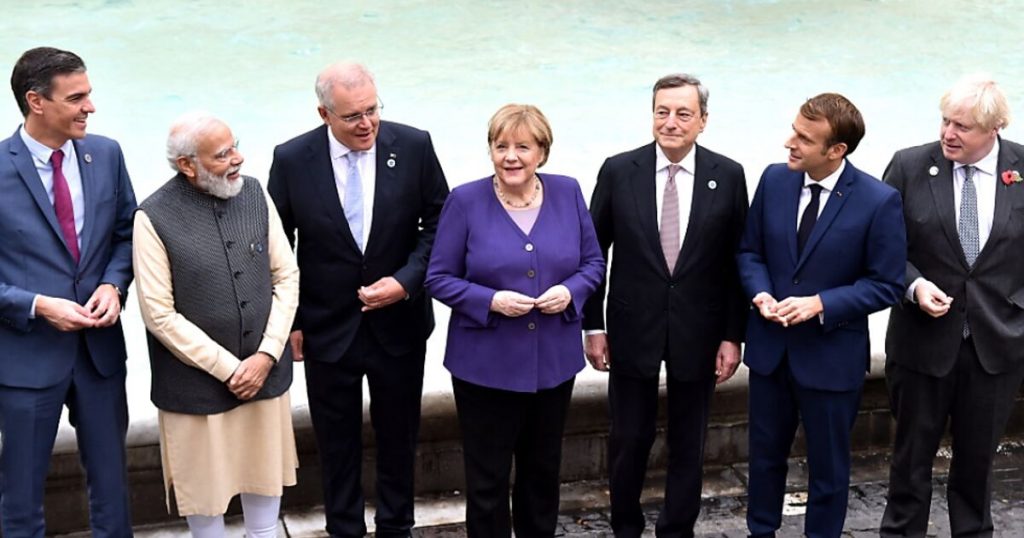At the start of the World Climate Conference in Glasgow, Scotland, hopes dashed for effective steps against dangerous global warming. Major economic powers were unable to agree on joint ambitious climate goals at their G20 summit in Rome, Italy on Sunday. The final declaration does not contain a specific target date for significant CO2 neutrality nor for the phase-out of coal power generation.
Outgoing German Chancellor Angela Merkel assessed the decisions after what was likely the last G-20 summit as a “good signal” for Glasgow. Climate protectors, on the other hand, have been disappointed by the position of the G-20 countries, which produce 80 percent of climate-damaging greenhouse gases. “I am leaving Rome with unfulfilled hopes – but at least they are not buried,” tweeted UN Secretary-General Antonio Guterres, who traveled from the G20 to attend the climate summit on Sunday.
Over the next two weeks, about 200 countries will fight in Glasgow to see how global warming can be contained to a tolerable level. The states’ previous plans are far from sufficient to avert impending climate catastrophe.
The Earth’s temperature has already warmed by about 1.1 degrees compared to pre-industrial levels. In Paris, six years ago, the international community agreed to limit global warming to 1.5 degrees if possible. The G-20 only confirmed in the summit statement that it remains committed to the goals of the Paris Agreement. However, experts believe that it is necessary to make a significant improvement in the action plans of each individual country.
At least international public funding for new coal-fired power plants should end by the end of the year. Countries also emphasize the goal of providing developing countries with $100 billion annually by 2025. However, a number of countries have resisted specific target dates, for example regarding climate neutrality. The 2050 figure in an earlier draft was deleted again due to pressure from China and other participants. Germany wants to be climate neutral by 2045, which means it will no longer emit any greenhouse gases in the public balance. China, on the other hand, has a target date of 2060 so far.
Merkel saw it as a success that the “Group of Twenty” jointly adhered to the Paris Agreement for the first time since 2016. Then US President Donald Trump left. His successor, Joe Biden, who attended the regular G-20 summit in Rome for the first time, reversed the move as one of his first official acts.
The second big theme in Rome was the fight against the epidemic. The G-20 has clearly supported the WHO’s goal of vaccinating 40 percent of the population in all countries by the end of the year and achieving a 70 percent vaccination rate by mid-2022. To this end, the group of countries wants to expand the supply of vaccines and remove delivery and funding constraints, As stated in the summit declaration. The Kovacs International Vaccine Distribution Platform, which has not yet achieved its goals, should be able to operate more effectively.
The G20 countries also want to support local manufacturing capabilities by strengthening technology transfer centers in different regions. The newly established regional centers in South Africa, Brazil and Argentina are named. The document does not address the patent suspension called for by G20 countries such as South Africa, India and China. While about 70 percent of vaccines are already vaccinated in rich countries, the rate in poor countries sometimes reaches only three percent.
In Rome, Germany and other leading economic powers also called for the rapid implementation of international corporate tax reform. The final declaration states that it calls for the rapid development of the necessary systems and tools. It is important to ensure that the reform takes effect in 2023. Its primary objective is to prevent corporate profits from shifting to tax havens. So large, internationally active companies must pay taxes of at least 15 percent regardless of where they are headquartered by 2023 at the latest.

“Food practitioner. Bacon guru. Infuriatingly humble zombie enthusiast. Total student.”








More Stories
Kyiv: Russian Kursk offensive halted
US Presidential Election: Former US Government Officials Warn Against Donald Trump's Election
Netherlands wants to leave asylum system